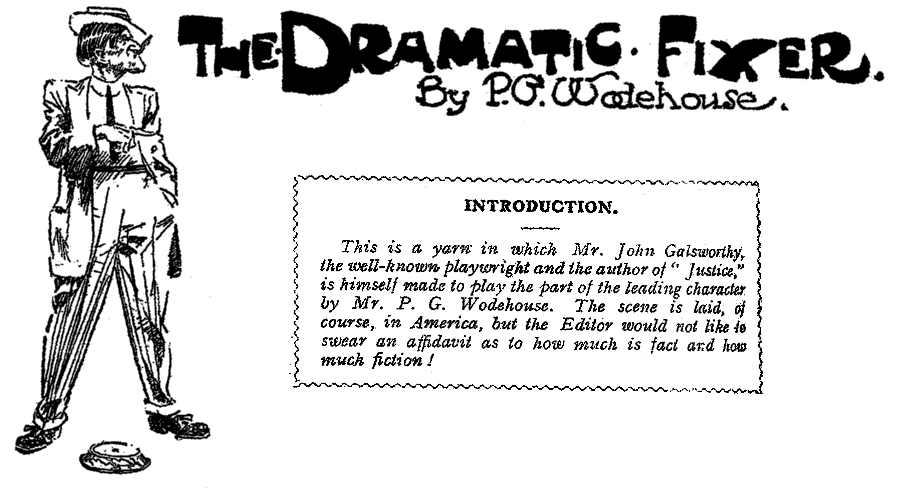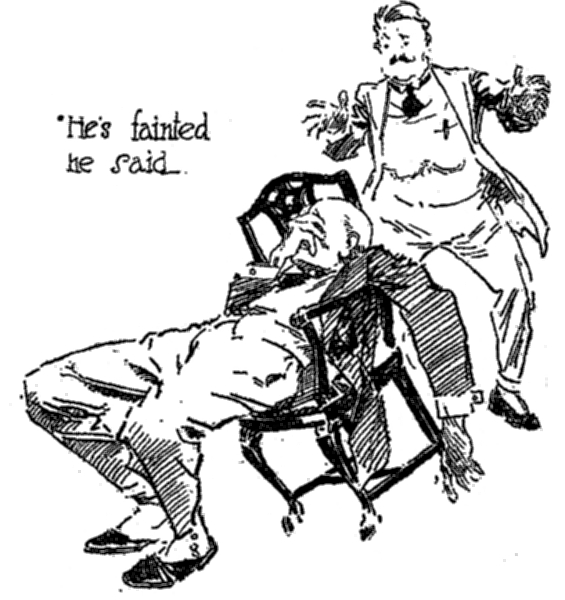The Passing Show, August 26, 1916

THE Fixer—we may write of him in the past tense—was a gentleman of uncertain age and habits with a bad complexion and a face either too little or too thoroughly shaved, but in whose unerring judgment as to what the public wanted, managers had a faith that was touching, based on the fact that back in the nineties he had once rewritten a failure and turned it into a success. He was the man who was “called in,” “spoken to,” or “arranged with” to “fix” the young author’s play. He wore a soft hat and twisted between his lips a permanently unlighted cigar, and he always began his remarks, when he did not begin them with “Say, lemme tell ya somethin’!” with the words “Say, lizzun, I’ve been twenty years in this business!” It was his task, which he performed with the gusto of a child disembowelling a Teddy Bear, to take the young dramatist’s play and, having removed all that was fresh and original from it on the ground that “They” didn’t want “that sort of stuff,” to insert material which was “bound to go” because it always had gone.
Few people know what trouble Mr. Galsworthy had with the Fixer, but here is a truthful account of it, published for the first time.
Entering the office of the manager, in response to a letter asking him to call, Mr. Galsworthy found him in conversation with a complacent-looking person with a shaven neck and an unlighted cigar, who was leaning back in a swivel-chair with his thumbs in the armholes of his waistcoat.
“Shake hands with Mr. Whoosis,” said the manager. “I kinda like that little play you sent me, and I’ve arranged with Mr. Whoosis to fix it.”
“Indeed?” said Mr. Galsworthy blankly.
The Fixer shelled the spittoon with indirect fire and shifted his cigar from east to west.
“Say, lizzun,” he said, “I’ve been twenty years in this business, and I know what I’m talking about. You’re a novelist, ain’t you? I thought so. Well, novelists can’t write plays.”
“Why not?” said Mr. Galsworthy.
“Because they can’t. I’ve been twenty years in this business and I know. Now, see here, I’ve been reading this thing of yours, this—what’s it called?—‘Justice,’ and I can see where I can make something of it. But it’s all wrong as it stands. They don’t want that sort of thing. The stuff’s there, but it wants fixing. Now, lizzun. Take the first act. You make your hero a poor clerk who raises a cheque from nine to ninety pounds so as to be able to run away with a married woman. That’s no good. He don’t get the sympathy of the audience. They ain’t interested in clerks, and he’s got to be accused of something bigger than a piking thing like that. And you’ve got to have a straight love interest, else you won’t get the matinee girls. Say, lemme tell ya somethin’. Here’s the way this first act ought to be. You’ve got to make this William Falder the son of a millionaire who’s lost all his money on Wall Street. I’ll write in a prologue showing him doing it, and young Falder, who’s just come back from Harvard, slaps him on the back and says ‘Cheer up, dad, I’ll restore the family fortunes.’ See? You get a punch that way, because nobody ever thought the boy had it in him. I introduce the girl in the prologue too. Her father’s a millionaire, and he won’t let her marry young Falder now that his father’s lost his money. You get a story that way. Then we go on to what’s now your first act. Young Falder is working in the offices of another millionaire. You get some love stuff when the girl comes to see him. Then Cokeson raises a cheque from a hundred to a hundred thousand and plants the job on the boy. You’ve got to make Cokeson the villain, y’understand. There’s nothin’ to him as you’ve got him. He’s just an old man. Well, there’s a fuss of course. The boy’s arrested. In comes the girl. ‘Oh, Harold,’—you’ve got to change him to Harold. They ain’t interested in Williams.—‘Oh, Harold,’ she says, ‘I know you are innocent of this frightful charge. Tell me you are innocent.’ The boy turns to her and folds her in his arms and says ‘Hilda, as there is a God in Heaven, I am guiltless.’ Curtain, on a peppy situation!”
“But,” says Mr. Galsworthy, “doesn’t that rather spoil the motive of the play?”
“Naw. It gives it a motive,” said the Fixer.
He shifted his cigar from west to east. “Now, then, let’s take your trial scene. Say, anyone could see you were an amateur by the way you’ve handled that. There’s no drama in it. The way you’ve got it, the audience knows the fellow’s guilty, and that there isn’t a chance on earth for him. There’s no dramatic suspense. And, gee! young Falder might be a forty-a-week part instead of the star’s, the way you’ve kept him off the centre of the stage. I’ve fixed all that. The way I’ve laid it out, there’s some sense in Cokeson’s appearance on the stand. The audience know he’s a crook, and they’re waiting to see how he’ll make out. He tells his side of the thing, and then you get a big dramatic moment. He says that when he gave Falder the cheque to take to the bank it was only for a hundred pounds. Young Falder leans out of the dock and points his finger at him and shouts, ‘You lying hound! As there is a God in Heaven, you know it was for a hundred thousand.’”
“But would a bank hand a hundred thousand pounds across the counter without making any inquiries?” said Mr. Galsworthy.
“Say, the audience won’t think of that. Well, now, where were we? Oh, yes. Now, lemme tell ya somethin’. You’ve got to put more of the girl into that act. I’ve laid out a scene where she talks to the hero—she’s on the stand, he’s in the dock. Dramatic contrast, y’understand. She says she still believes in his innocence. She denounces old Cokeson as the real crook, and then swoons, and the hero rushes from the dock, and catches her. See? Good Picture. Well, after you’ve kept the audience guessing all through the act, the jury find Falder guilty, and he’s sentenced to prison for three years. I get some drama into this, because in the course of the trial I’ve made the judge discover that Falder is really his son. Yes, I know you thought he was the millionaire’s son, but I’ve fixed that in the prologue, where there’s a line or two showing how the millionaire found him on his doorstep one night as a baby and adopted him. I’ve got a dandy scene during the trial where Falder, on the stand, takes out a locket with the picture of his dead mother in it and kisses it and swears by it that he is innocent, and the judge asks to look at it and goes all up in the air because it’s the picture of the dead wife he deserted twenty-five years ago. It links the story up, ya see.”
 “I see,” said Mr. Galsworthy faintly.
“I see,” said Mr. Galsworthy faintly.
“Now, we get to the prison scene. Say, lemme tell ya somethin’. You’ve just chucked away all the dramatic possibilities of that. Why, gee! you don’t make anything happen.”
Mr. Galsworthy said that he had thought that the scene of Falder’s solitary confinement would be rather impressive. The Fixer nearly swallowed his cigar in his disapproval. “Nothing to it!” he said. “Who wants to see a gink walking up and down and saying nothing? No, I’ve fixed that act fine. I make the convicts mutiny. I wonder you didn’t think of that, seeing you’ve planted for it by having them kick on their doors. Well, there is a big scene, and Falder escapes. And then we get the last act where he comes back, and old Cokeson confesses, and Falder marries the girl. Gives her a chance to come on in another dress, ya see. Your ending kills the show. They won’t stand for an unhappy ending. . . . Say, what’s the matter with this guy, anyway? What’s he crumpled up like that for?”
The manager was unloosening Mr. Galsworthy’s collar and calling the office-boy to bring smelling salts. “He’s fainted,” he said.
Mr. Galsworthy has never really recovered from the shock. Sometimes he still wakes up screaming in the night after a nightmare in which he is sitting watching the fixed version of his play. But he has the satisfaction of knowing that he has achieved a great reform.
For the Fixer has passed out of existence.
A slightly longer version of this piece originally appeared in July 1916 in the American Vanity Fair.
 Madame Eulalie’s Rare Plums
Madame Eulalie’s Rare Plums